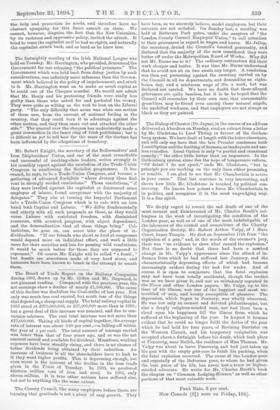The Board of Trade Report on the Railway Companies during
1893, drawn up by Mr. Giffen and Mr. Hopwood, is not pleasant reading. Compared with the previous year, the net earnings show a decline of nearly £1,500,000. The cause of this decline was doubtless the Coal-strike of last year. Not only was much less coal carried, but much less of the things that depend on„ a cheap coal supply. The total railway capital in 1893 stood at £970,000,000, or £27,000,000 more than in 1883 ; but a great deal of this increase was nominal, and due to con- version schemes. The real total increase was not more than £17,000,000. Taking all kinds of capital together, the average rate of interest was about 3.60 per cent.,—a falling-off within the year of I per cent, The total amount of tonnage carried was lower than that of four years ago, and so was the net amount earned and available for dividend. Meantime, working expenses have been steadily rising, and there is no chance of better dividends being obtained by their reduction. An increase of business is all the shareholders have to look to if they want higher profits. This is depressing enough, but even worse is the account of the decline in the iron trade given in the Times of Tuesday. In 1883, we produced thirteen million tons of iron and steel. In 1893, only eleven million. It is true other nations have suffered also, but not to anything like the same extent.


































 Previous page
Previous page